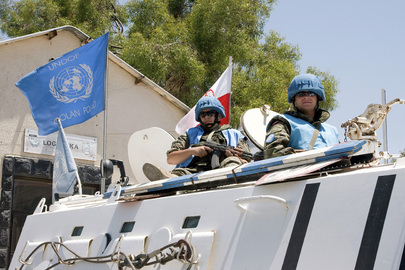Israel Fears U.N. May Leave Golan after Troops Seized
إقرأ هذا الخبر بالعربية
Israel on Thursday expressed concern that the U.N. peacekeeping force in the Golan Heights could pull out altogether after Syrian rebels snatched 21 of their troops in the ceasefire zone bordering Israel.
The soldiers, Filipino members of the UNDOF peacekeeping force, were taken hostage on Wednesday by gunmen who said they would be held until troops loyal to Syrian President Bashar Assad pulled back from Jamla village in the southern province of Daraa.
The rebels also accused the U.N. force of favoring Israel.
"This kidnapping is likely to convince countries who participate in this force to bring their troops home, which would undoubtedly create a dangerous vacuum in no man's land on the Golan," an Israeli official told Agence France Presse, speaking on condition of anonymity.
"Since its creation, this force has fulfilled its mission which was to keep the peace," he said.
Since 1974, the U.N.'s Disengagement Observer Force (UNDOF) has been monitoring the Syrian side of the armistice line with a force of 1,200 troops, although its number has recently dropped to 1,000.
Israel fears that the departure of UNDOF troops could leave a vacuum in the ceasefire zone between Syria and the Israeli-occupied sector of the Golan Heights, leaving it open to infiltration by hardline militant groups.
The top-selling Yediot Aharonot daily said Israeli officials were concerned that the U.N. force in the area would "be dismantled and that al-Qaida members will take control of the buffer zone between Israel and Syria."
"There is concern that al-Qaida will take over this buffer zone and the villages near Israel," the paper said of the 80-kilometer (50-mile) strip of land which is between half a kilometer and 10 kilometers wide (500 yards to six miles).
Syria remains formally at war with Israel, which captured part of the Golan during the 1967 Six Day War and annexed it in 1981, a move not recognized by the international community.
Israel controls some 1,200 square kilometers of the strategic plateau, while around 510 square kilometers remain in Syrian hands.
The U.N. has reported a growing number of incidents in the Golan over the past year with its forces in the buffer zone coming under fire from the Syrian side, prompting moves to boost security for the mission.
By the end of February, there were about 1,000 troops from Austria, Croatia, India and the Philippines participating in the UNDOF force.
Last week, Croatia said it was withdrawing its 100 troops over fears for their safety, following similar moves by Canada and Japan in recent months.



